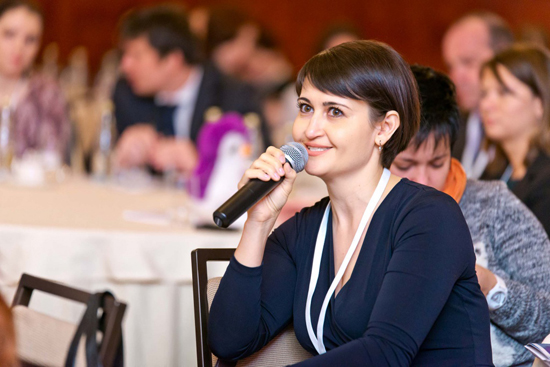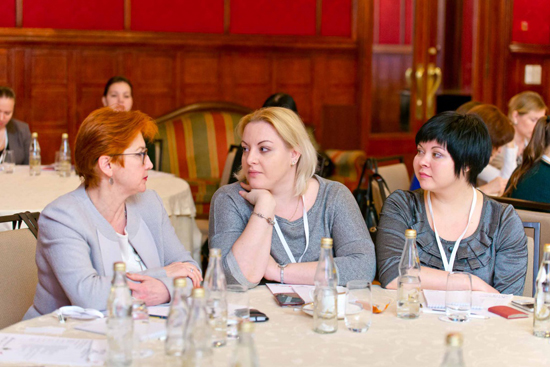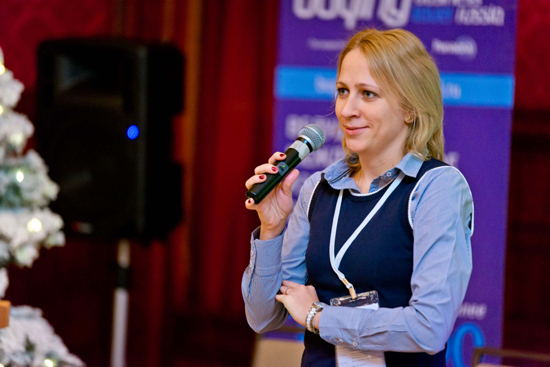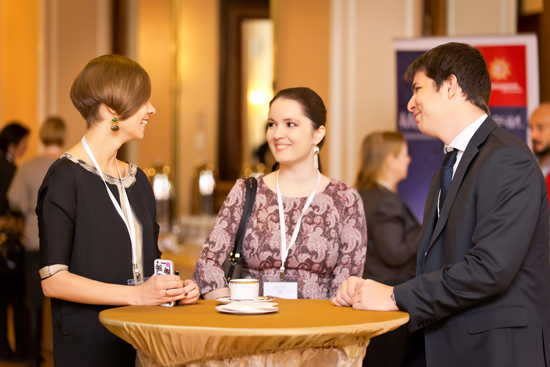End-of-year kaleidoscope of ABT-ACTE Russia: fanciful patchwork of business travel and MICE of the outgoing year
On December 2 the final educational session of ABT-ACTE Russia was held in the Red Hall of the Metropol. Representatives of the business travel industry shared their professional achievements, spoke about difficulties, compared results of their work with those of their colleagues, discussed prospects and set goals for the next year.
Together with the speakers of the event, the results of the expiring year were bottomlined by administrative directors, marketing and internal communications experts, heads of protocol offices, administration and business travel departments, travel and event managers of companies like MTS, Kaspersky Lab, ANO Sports Broadcasting, International Investment Bank, Shell, Reynaers, BNS Group, Mary Kay and others. Partners of the event were Switzerland Tourism Office, Incotrade Tour Operator, Air Charter Service, Czech Airlines and Meliá Hotels International.
As the moderator of the session and chief editor of BBT Russia Svetlana Denikina noted in her greeting word, this year had been tough for the industry, and you could hardly expect any indulgences in 2015. «At the recent EIBTM exhibition in Barcelona Ukraine crisis was named among top five risks for the Russian and the world business travel industry and MICE», Ms Denikina said. «The forecast of economic growth in Russia for 2015 is extremely moderate — about 0.4%, according to analysts. We will have to work in conditions of unstable exchange rate of our national currency. It is evident even now that these and other factors will lead to budget cutting, including costs of business trips and corporate events: according to expert estimates, the volume of the Russian business travel market will shrink by not less than 5%».
Nevertheless, in the opinion of Ms Denikina, we have learned a lot in 2014, especially from educational sessions and ABT-ACTE Russia seminars, and are ready for new professional challenges. «We are no more surprised at such terms as „big data“, moreover, there are likely to be guests in this hall who are used to working with a big bulk of data, transform it into smart data and use it for business purposes», the moderator of the session stressed. «This year we have started using advanced technologies of cost saving actively. Many companies have tried to conclude direct agreements with travel service providers in order to get better rates, switched to Online Booking Tools and started using single payment solutions like BTA that not only consolidate data, but also relieve TMCs of their credit load. Let us take care of our partners because travel agencies have already entered challenging times, as from January 1st IATA will toughen requirements to BSP reports — and they will have to pay for airline services even more frequently, almost once a week».
Administrative manager of Covidien Elza Abadovskaya shared her experience in cutting business travel costs. At the first stage changes in their local travel policy affected airline and railway tickets. «Our employees could earlier buy an economy class ticket with an „optimum economy“ rate, the price of which was close to that of business class, and it did not contradict to our travel policy. So we spelled out rate groups and now business travelers have to choose the most cost efficient variant» the speaker said. «We have also introduced certain rules of choosing railway ticket classes. And we have also spelled out in big red letters that an unjustified return or cancellation of a business trip is the employee’s personal responsibility. If you forgot to cancel your hotel booking, you should account for it». By the way, due to this rule in the third quarter of 2014 the amount of ticket cancellation fines decreased by more than 41,2%.

The cost optimization program has also led to signing direct agreements with hotels in Moscow and Saint Petersburg, because, as data shows, these cities are most frequently visited by Covidien employees. Besides, new accommodation costs have been included into the travel policy and only one room category has been allowed — standard rooms. «In order to provide our internal customers with cost efficient accommodation, our travel agency and we have made a list of recommended hotels with a good service level. It is especially useful when you need accommodation in the regions of Russia», Ms Abadovskaya added. Besides, the company limited taxi costs and recommended business travellers going by aeroexpress. As the result of such changes, ticket costs fell by 29.3%, railway costs — by 7.1% in the first quarter of 2014. And one day’s accommodation in Moscow got cheaper by approximately 28%.
The second stage of cost cutting in Covidien started with a tender, the current provider and travel agencies recommended by industry peers were invited to participate in it. As the result the company held negotiations with the current provider and managed to reduce all service fees considerably. Thus, after an amendment agreement with the provider had been signed, in the third quarter the cost of one night’s stay in the regions got lower by 8.2% due to a decrease in hotel booking fees. «Next year we will probably continue cutting business travel costs», Ms Abadovskaya declared their future plans. «We may sign direct agreements with regional hotels and airlines we fly with most frequently».
The Business and Conference Hotel Attestation Program of ABT-ACTE Russia is intended to help a business traveller or a travel manager to get his way in the vast choice of hotels. It was described in detail by Vladimir Serdiuk, Attestation of Business and Conference hotels department specialist. The program has been run for three years already and it now includes about 100 accommodation facilities in more than 40 cities of Russia and the CIS. «In order to certify hotels the Association of Business Travel worked out a standard including 345 criteria to certify a business hotel and 400 criteria for a business and conference hotel», the speaker specified.
The survey has shown that business travellers consider high speed Internet that works without fail on the whole hotel territory, an opportunity to pay with a card, round-the-clock room service and safety the most important when they choose a hotel. «At the same time, in addition to an alarm button, a fire extinguishing system, a safe, we insist on confidentiality of accommodation — for example, we require that hotel staff do not pronounce the guest’s room number» Mr Serdiuyk stressed. Besides, according to the speaker, most respondents find it very important to have night curtains and a good sound absorption.
«What is so special about out program? We insist on providing an equipped working zone in every room. There should be a desk, a chair, a lamp in every room. Besides, at least one computer should be available to hotel guests» Mr Serdiuyk added. If a hotel completes attestation and meets all the requirements, it is granted a certificate that is valid for three years, during this time the Association inspects the hotel — it sends a mystery guest or holds quick audits.
The topic of hotels was continued by Nikita Ushakov, Senior sales manager of Melia Hotels International — a rapidly growing hotel chain that now includes 351 hotels in 4 continents in 35 countries. In the speaker’s opinion, hotels of Meliá chain are the most interesting for corporate buyers, because they are mainly congress hotels located in key points of large cities in Europe, Asia, Latin America and Middle East, not long ago a hotel was opened in Eastern Africa — in Tansania. And for the most part Meliá hotels are four star hotels (although 5 star hotels are also available), which meets travel policy requirements of most companies.
Tatiana Poplavskaya, director of corporate support department and managing director of JSC Otkritie Holding spoke about business travel laws. «First of all, the travel manager himself is of primary importance for me, because any process and any facilities are nothing without people who create them», Ms Poplavskaya noted. In the speaker’s opinion the way a travel manager perceives and positions himself is very important — whether he is a dealer who just purchases airline tickets at a lower price or a comprehensive business partner.

Ms Poplavskaya paid special attention to the fact that professional skills, knowledge and experience are very important for a business travel expert. At the same time directors should know the way things are done, but do not need to be in the know of the technology itself. «I believe in the team. And the one who can build it will be the winner!» the expert thinks. «In our holding a team of 6 employees arranges about 4000 trips per year». The speaker stressed the director’s role who should set an example of business behaviour. If the boss is professed, committed to work, unbiased, quick, flexible, sympathetic, the team will be the same. «And do not be afraid to praise! It is very important!» Ms Poplavskaya advised. «When a person has done something above the norm, has invented something and not just fulfilled his job duties — thank him, but in such a way that everyone hears it. It is one of the most important laws».
Other keys to success, in speaker’s words, are correct processes and procedures that meet the requirements of a certain business in a certain situation. They should be very clear and have an unambiguous interpretation, as well as be logic and justified (if you prohibit something to your employees, you should explain why). A cornerstone of success is travel policy — a kind of a bylaw that includes a formal description of all these processes. Moreover, apart from the rules themselves, their implementation is also important — the way you put travel policy into practice. An important role belongs to Clever Purchasing, communication inside the company — with directors and the staff (it is vital to stay unbiased and fair all the time), proactive work, as well as the right choice of providers and further cooperation with them.
Besides, Ms Poplavskaya recommends using case studies when choosing a provider. «If you give several real examples from your previous professional experience, and providers will have to settle this situation in a short time, you will see whether they are capable of completing certain tasks quickly, properly and with zest», the expert noted. Also Ms Poplavskaya advised never to forget about the main business travel law — communication!
Indirect procurement manager of Cordiant Maria Nizyaeva shared her experience in holding a tender for TMCs. As the speaker said, at the preparatory stage it was necessary to formulate service requirements, for example, to set priority directions and the list of hotels they were interested in. Also Cordiant employees worked out criteria to choose a travel agency. They include minimum rates, an opportunity to work under threelateral agreements with air carriers and hotels and requirements to TMC`s online system.
«Then we held a number of meetings with travel agencies, inquired information for analysis from them, held talks with hotels on the opportunity of concluding direct agreements, as well as talks with large air carriers on conclusion of a threelateral agreement», Ms Nizyaeva says. «Subsequent to the results we issued a final brief including an all-inclusive list of requirements. And then we held the tender: we sent briefs to all the participants (about 25 companies). Then was the stage of offer collection and analysis. And correspondingly, the choice of a TMC that we are now in the process of concluding an agreement with».
What did Cordiant get as the result of the tender? «First of all, a new way of booking: if before we sent requests by email through a travel manager, now we will work in an online system with a personal account for every employee», the speaker said. «Secondly, we managed to cut airline booking fees by 75%. Hotel accommodation costs in our priority directions were decreased by 5,2 to 13%. Besides, before our employees had to deal with visa issues themselves, now this service will be offered to us, and what is more, at the minimum fixed rate. Payment conditions have changed: we used to work on 100% pre-paid basis, now we are switching to 100% postpayment. Also due to the single system and online tools we will have an opportunity to form consolidated reports for all the companies for a certain period».
Head of event department of Coral Club International Marina Surzhikova told the participants how to create an event and travel department almost from scratch. The speaker listed all the possible positions and job duties of department employees who deal with event and business trip arrangement and dwelled upon so called implants — TMC employees situated in the customer’s office. Ms Surzhikova said that if for example a large number of similar events was planned in different cities of Russia and the CIS, it was hard to do without an implant. «This person works in our office, but there is a whole company behind him. So you can give big amounts of work to such a coordinator — even arrangement of 40-50 events per month».

Based on her professional experience, Ms Surzhikova named three types of companies according to their inherent structure of event and travel departments. The first type, according to the speaker, includes international companies with a European or American multi-level management system. This structure is the most convenient to work with, Ms Surzhikova supposes. The second type includes Russian companies with a developed system of business trips and a large number of events. «As a rule, there are no levels of jurisdiction in such companies. And if only one employee falls out of the working process for some time, everything goes wrong, because one manager does not know what the other does», the expert said.
And finally, the third type is a «young» company where event and travel departments are only to be created. The expert spoke in detail about the way business trips and events were organized in Coral Club International when she only joined the company and how they managed to build a new structure of the department. «For example, we had to explain to our bosses that it was not an assistant who should book hotels and tickets, and the company would only benefit if we had a Business travel & visa specialist», Ms Surzhikova added. The speaker clearly illustrated the structure of the department in her presentation and described nuances of its work in detail. «Of course, there is no single rule of creating an event and travel department, but you should take into account special features of the company and its needs for events and business trip arrangement», the expert stressed. «For example, our event plan for the next year has more than doubled, and we had to alter the workflow of the department for this reason».
Lead Corporate Event Specialist of Beeline Angela Starkova spoke about the most problem-plagued and at the same time her favourite project of the expiring year. The event aimed at increasing loyalty of corporate customers to Beeline brand was held in the form of Winter Olympics in Sochi, although it was held in the middle of summer in Moscow. «Many event agencies still focus on a creative and unhacked concept and new ideas», the speaker noted. «But it is self-evident. Nowadays priorities of event arrangement have changed. First of all, the brand should fit the event concept ideally — it means that it does not always make sense choosing some ideas you may consider interesting, but that absolutely contradict corporate values and communication strategy. Such an event may be a fail only because guests do not link one to the other. And second, it is important to follow trends: every season cultural, pubic, political life introduces new names, events, actions and subsequently new concept ideas».

Why was the Olympic concept chosen? «This is an event of giant scale, not only for our country, but for the whole world. Besides, sport activities comply with Beeline values that also include honesty, competition and motivation to be the leader, above all. Besides, many images connected with the Olympic Games have become very popular and recognizable (the logo, souvenirs, animal symbols, the fifth ring that has not opened) — this is ideal material for a scenario and the design of an event», Ms Starkova explained.
The last point was a real problem. «When the project was already in work, the agency manager called us and said that all this had been already patented», the speaker recollects. «At the moment patent rights were being transferred to IOC, and it was impossible even to send a request. We had to urgently redo all the pictures, every draft, so that they looked not more than 50% like the patented Olympic images». But as the result we created such an atmosphere that guests who were not acquainted — and there were about 160 of them — felt like friends in the Olympic park. It was largely due to thematic quizzes, the entertainment part and accents on details. For example, the sign in the veranda showed the height above the sea level, and figure skaters danced right in the hall.

During coffee break and lunch ABT-ACTE Russia guests discussed burning issues and shared their professional experience. And the final educational session ended with a lottery that included two vouchers for a breakfast in the Metropol (for two persons), a voucher for dinner (for two persons) in Renaissance Monarch restaurant of the hotel, two certificates for a transfer around Moscow from Accord and a Mont Blanc pen from Air Charter.
Natalia Travova